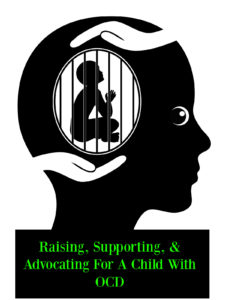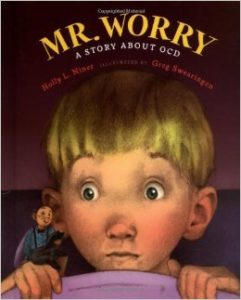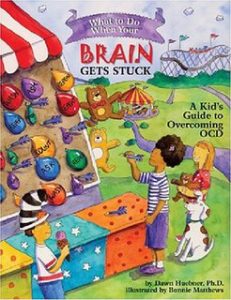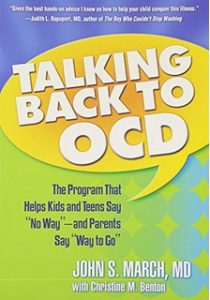Raising, Supporting, and Advocating for a Child with Obsessive Compulsive Disorder (OCD)
Raising a child with Obsessive Compulsive Disorder (OCD) brings with it some significant challenges. It can at times be difficult as a parent to provide support and also challenge the child to not disappear into the OCD.
If a child is suffering with OCD…meaning that at the moment it is causing emotional distress, interfering with education, sleep, or social pleasure please seek professional help.
This is one of the key ways that parents can advocate for a child with OCD. Just taking notice that there is a problem and recognizing that it is not something they can “knock off” really is a profound first step. If you are not sure what OCD is and how children experience OCD you can read more here. If you think you have a good understanding of what Obsessive Compulsive Disorder is but are not sure if your child needs professional help this questionnaire may help clarify the situation. Take Quiz here.

Raising, Supporting, and Advocating for a Child with OCD
PROFESSIONAL TREATMENT
Once you have determined that the child would likely benefit from professional evaluation and treatment it is important to find a therapist who has experience working with children and OCD. A therapist who has treated OCD in adults may not be prepared to address the differences in a child’s reasoning. To read more about treating OCD in children click here.
Children have a harder time determining what is real and not real. They also have magical thinking that at times makes them believe that they can make things (good or bad) happen when they cannot. A therapist who is experienced working with children and OCD can utilize these distinctive childhood traits and take them from areas of weakness to strengths in the treatment of OCD.
Finding professional help is an important aspect of treating OCD. Talking about and acknowledging OCD thoughts and behaviors is not enough to resolve or treat them. In some cases the repetitive discussion may further reinforce the symptoms of OCD.
Even if an ideal treatment arrangement is made for the child there is still plenty of management of OCD that happens at home.
UNDERSTAND THE CHILD CANNOT STOP
As parents we tell our kids what to do and not to do all day long. It can be difficult when the child is doing something that appears to be ridiculous and is time consuming. If the child is taking too long to get out the door to school or is obsessively rewriting homework pages it is tempting to snap at them to knock it off. Remember that they can’t and that they are not being defiant.
Similarly, if the child has routines that are making them unable to get to bed in a timely manner it may be tempting to prohibit parts of the routine or try to force them to not complete the routine. This could be very distressing to the child. The result could be emotional outbursts that feel to the child like the OCD is attacking from the inside and now there is an attack from the outside.
It can be very difficult to remember that the child feels compelled to engage in behaviors including verbal behaviors such as confessing bad thoughts or seeking reassurance. During a particularly active phase of the OCD the child may be repeatedly confessing or seeking reassurance numerous times an hour. This can grow tiring and become bothersome especially when life is busy and there are other things to do. It can be difficult to maintain a supportive tone of response.
This can also cause family strain especially if parents are not on the same page. It can be an invaluable service to the child to make an effort to gather information and discuss plans to support the child consistently.

Sad and Stressed Kid sit by the Wall outdoor
EMOTIONAL SUPPORT
Help your child feel like they are still a normal healthy child. Help your child understand that they have some control in the situation and that they have your full support.
These are some books to read with your child to help them understand OCD and demonstrate that you understand as well. They may not understand why they cannot just stop, and may feel like they are letting down those who love them.
OCD especially when it manifests in young children has been found to be a highly inherited trait. While the exact cause of this remains unclear it is likely that a very close relative of the child also has OCD. If possible it may help the child to feel supported to talk to others who have been on this shared path. I know that it is highly comforting for my little man to know that I can understand his mind’s working and how it feels to him.
These books could be helpful when communicating with your child about their OCD and trying to support them at home.



Giving a child a model outside of themselves of someone else being able to overcome OCD can also be helpful. This could come in the form of a character in a story that they can identify with. For us we found an amazing resource in Disney’s Fantasmic. It was all quite by accident but it fit perfectly. In the show Mickey Mouse has his dreams taken over by evil and he successfully fights off that evil to regain his positive dreams. In the beginning he is timid and fearful and in the end feels strong and empowered. The show provides a lot of visual imagery and just fit perfectly. We replaced the idea that these were dreams with thoughts and just like that he had a perfect visual go to. We used that imagery to guide him through some very rough moments.
You can also help your child a great deal by reassuring them that they have a bright happy future. OCD is something that can be managed and with appropriate structure can be channeled into great success. My OCD allowed me to be a terrific student with excellent study habits. It has assisted me in my career because it allows me to function well in routines. There are people who find the routines of adult life to be grueling and highly limiting. My OCD makes me a great planner, helps me to finish what I start, and be successful. My OCD presents challenges that I have had to learn to manage and there are difficult times. I would argue that no human trait is all good or all bad. OCD is the same. There is strength to be found and built on.
REDUCE STRESS AND ALLOW TIME
The experience of OCD symptoms can be worsened with stress. When a child has OCD it is a good idea to avoid stressful changes to routines when possible, and to limit the amount of outside commitments to what is easily managed.
A child with OCD may need more down time to manage the emotional strain. Also of consideration is that OCD rituals can be very time consuming and it is more stressful for the family when they are rushing to more time commitments like soccer, piano, baseball. When selecting additional activities consider the time strain and how OCD rituals would be impacted.
When the child is having a bad moment take time to sit with and comfort the child. This goes hand in hand with understanding that they cannot just stop it. When we are rushing about trying to get a million things done and get to an appointment on time it can be difficult to allow the child to adhere to basic routine or sit with them when they are having a meltdown. We will not be perfect that goes without question. It goes a long way however when they feel supported and understood.
ROUTINES AND STRUCTURE
Routines and predictability go a long way for providing comfort to a child with OCD. Even positive changes in routines can trigger an OCD flare up. Changes like school ending for summer for example can trigger a worsening of OCD symptoms even if the child is highly pleased with the change.
When planning your days schedule allow extra time where needed to avoid rushing when it may add distress as the child completes rituals.
Some things to consider: bed time routines, homework routines, babysitting/childcare routines, food routines, morning getting ready routines, extracurricular activities.

Child psychologist with a little girl, a child is crying
ADVOCATING
When a child has OCD they may function very well most of the time. As parents we see our child more than anyone. We know what it looks like when they are struggling. We are best able to notice when symptoms are beginning to intensify. Often in OCD symptoms can increase and leave us wondering why.
It helps a great deal to tale some time and think about what has changed or stressed your child. The OCD symptom increase may be about door locking or worrying about germs. The trigger might be a change in their routine, poor sleep over the past few days, a worry about an upcoming change etc. The point being that if we pay close attention we may be able to detect if the symptoms tend to worsen if the child is over tired, their schedule changes, they feel like they are doing poorly in school, or are facing social challenges.
Keep track of symptom intensity in a notebook. This does not have to be a daily update. I would say that it helps to make note when you notice any increase in symptoms. Include a brief description of the symptoms you are seeing. Symptoms change over time and it can really help to have it written down. As things change it can be hard to remember how they were. Also include an estimated frequency of symptoms and a list of things that are going on at the time you think may be triggering the change. Over time a pattern can emerge that provides you solid information to use when advocating for your child with the school, therapists, doctors, and socially.
School: Make sure your child’s school is aware of what your child needs in a classroom setting and teacher in order to have maximum success. They may need a highly structured classroom or specific personality traits or style from a teacher. These are all fair requests that need to be presented clearly and at least a couple of times a year.
At the beginning of the year meet with the child’s teacher. Explain how your child experiences OCD. Every person with OCD is different and you want the teacher to understand specifically your child. Tell the teacher what to watch for behaviorally. This may be certain types of questions, rituals, or efforts to isolate from peers.
Encourage the teacher to reach out to you immediately if they begin to notice changes. It is also important that if you are seeing a flare up or new symptoms at home that you would contact the teacher with any update.
Therapist/Psychiatrist: Keeping a log of your child’s symptoms is extremely valuable information. It provides a measure of intensity and triggers that exacerbate the OCD. It provides a clearer picture about the success of treatment. Being able to provide strong information for treatment providers can increase treatment effectiveness.
Medical: Inform your child’s doctor about their OCD experience and any medication that they may be taking as prescribed by another treatment provider.
Social: OCD can have serious social ramifications. You can assist your child by supporting social engagements that your child enjoys. Make time for play dates in places with peers that work well for your child. Encourage involvement in activity that plays to their strengths. Give them as many outlets for social interaction and places to excel as possible.
Don’t try to hide the OCD. If they get close to a peer and want to be social then it may help to have a conversation with that child’s mother or the coach. Letting people in on the situation does not have to be done in a way that indicates that your child is weak or struggling. It can be done in an undramatic supportive way. Letting the other adults in on it in an easy going way demonstrates to your child that there is nothing to be ashamed of and helps to build a supportive social network.
As parents we can’t make OCD go away. But we sure can make a difference in how it gets managed.
Other articles about Childhood OCD:
The OCD Child: Obsessive Compulsive Disorder in Children

Shannon
Latest posts by Shannon (see all)
- Social Anxiety: More Than Shy - July 10, 2016
- 3 BIG Reasons To Give Children Specific Meaningful Praise - June 27, 2016
- Protecting Children From Sexual Predators: Safety Without Paranoia - June 6, 2016


Leave a Reply